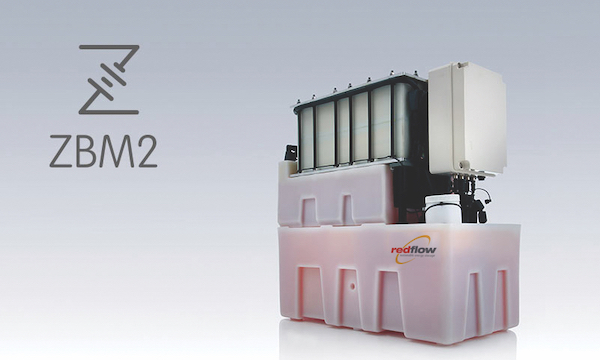
Australian energy storage company Redflow Limited (ASX: RFX) has won a follow-up sale of 32 zinc-bromine flow batteries to provide standby energy storage for mobile phone towers in South Africa.
This second sale follows an initial order last month for five batteries for use at mobile phone towers run by a leading South African telecommunication company. The towers are owned by a local company that is supported by the South African Government’s Black Economic Empowerment (BEE) affirmative action agenda.
Redflow CEO Tim Harris, who received the new order after a visit to South Africa last week, said it clearly demonstrated the technological and commercial viability of Redflow’s zinc-bromine flow batteries for telecommunication deployments. “Our batteries thrive on heat and hard work, which is what these sites in South Africa require. Following yesterday’s Optus announcement, today’s new sale further highlights the value proposition that Redflow’s ZBM2 zinc-bromine flow batteries deliver to telecommunications companies, both in Australia and overseas,” he said.
Redflow’s long-term South African partner, Specialized Solar Systems (SSS), working with renewable energy specialist Amber Energy, is providing the energy storage and telecommunications skills to deploy the batteries at remote mobile phone towers. This new order of 32 batteries will support the telecommunication company’s mobile tower rollout program to March 2019.
SSS CEO Peter Bergs said the new order followed the successful delivery of the first five Redflow batteries. “This telco is expanding its infrastructure rapidly, so it has an aggressive schedule to deploy mobile phone towers with energy storage provided by Redflow batteries.”
“Redflow’s batteries are ideal to store solar energy for mobile phone towers, which are often located in remote areas. These batteries maintain their energy storage capacity despite working hard, day in and day out, and also tolerate warm climates, which are common in South Africa,” he said.
A major benefit of Redflow batteries is their ability to operate in Standby Power System (SPS) mode, where the batteries are charged and then placed in a dormant state, with no self-discharge, until they are required to supply energy during a power outage. Redflow’s SPS mode avoids the need for a standby diesel generator – eliminating the cost, complexity and risk of storing fuel at the site.
The 240kg size and lack of saleable components in Redflow batteries also discourage theft, an endemic problem with legacy batteries.
Redflow is building its presence in the South African telecommunications market after establishing its flow batteries with customers in manufacturing, such as Bosco Printed Circuits in Johannesburg, and local government, such as Mossel Bay Municipality in Southern Cape, as well as at residential sites.
For media assistance, call John Harris on +61 8 8431 4000 or email john@impress.com.au. To download high-resolution images, please visit the Redflow photo gallery.
About Redflow
Redflow Limited, a publicly-listed Australian company (ASX: RFX), produces small 10kWh zinc-bromine flow batteries that tolerate daily hard work in harsh conditions. Marketed as ZCell and ZBM2, Redflow batteries are designed for high cycle-rate, long time-base stationary energy storage applications in the residential, commercial & industrial and telecommunications sectors, and are scalable from a single battery installation through to grid-scale deployments. Redflow batteries are sold, installed and maintained by an international network of energy system integrators. Redflow’s smart, self-protecting batteries offer unique advantages including secure remote management, 100 per cent daily depth of discharge, tolerance of high ambient temperatures, a simple recycling path, no propensity for thermal runaway and sustained energy delivery throughout their operating life.
Related News
- New Redflow partner predicts battery boom as WA solar tariffs end TIEC Services founder Leith ElsegoodWest Australians are increasingly seeking the benefits of new-generation batteries as the State’s generous solar feed-in tariffs start to disapp...
- Federal Minister’s visit unveils Redflow and Optus resiliency initiative for mobile networks (From left) Optus Retail’s Cameron Penfold, Federal Minister Paul Fletcher with Redflow MD Tim Harris and Redflow batteries Australian energy storage company Redflow Limited has p...
- Redflow chooses Thailand for battery factory Redflow CEO Simon Hackett: ”We remain on track to commence production with our new manufacturing partner MPTS as planned”Australian battery company Redflow Limited has today announ...
- Redflow cashes up to target demand areas Redflow Executive Chairman and CEO Simon Hackett with ZCellAustralian battery company Redflow Limited today unveiled an investment package that will raise $14.5 million to tar...





